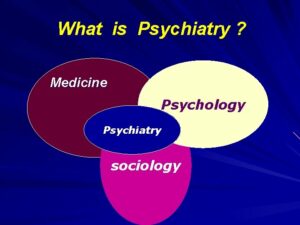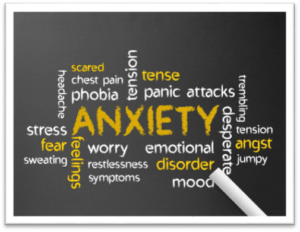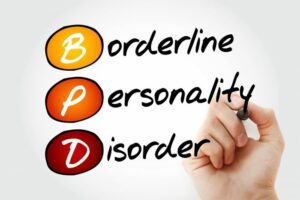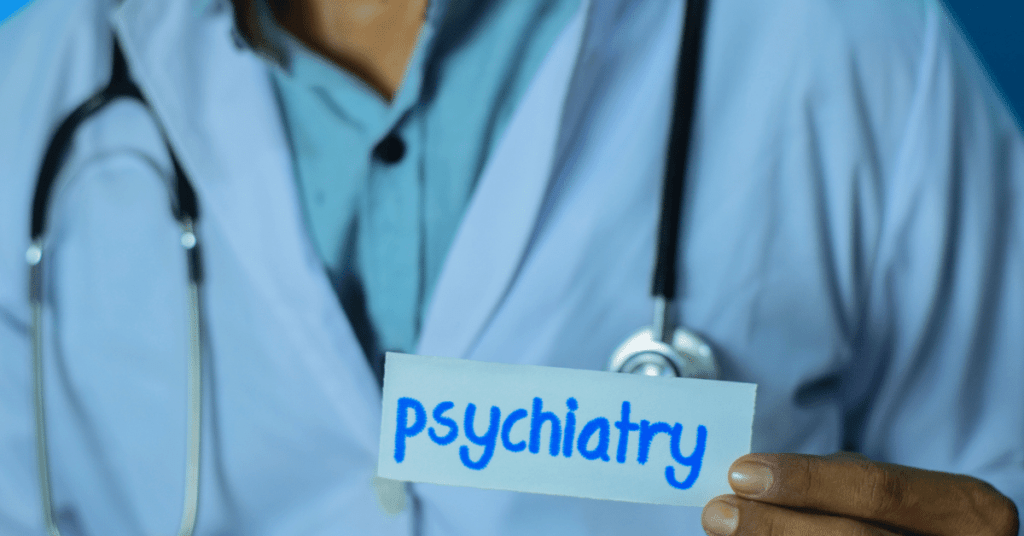Contents
What Is Psychiatry?
 Psychiatry is a medical specialty that studies the prevention, diagnosis, and treatment of mental health disorders. The practitioners are experts for mental, emotional, or behavioral conditions. Psychiatrists diagnose disorders or any kind of problems that may manifest because of a brain disease, illness, or disability. One of the main objectives in psychiatry is to provide a comprehensive evaluation and to provide a treatment plan for the patient. As psychiatrists specialize in mental health, they are qualified to prescribe psychiatric medication for treatment as well as psychotherapy.
Psychiatry is a medical specialty that studies the prevention, diagnosis, and treatment of mental health disorders. The practitioners are experts for mental, emotional, or behavioral conditions. Psychiatrists diagnose disorders or any kind of problems that may manifest because of a brain disease, illness, or disability. One of the main objectives in psychiatry is to provide a comprehensive evaluation and to provide a treatment plan for the patient. As psychiatrists specialize in mental health, they are qualified to prescribe psychiatric medication for treatment as well as psychotherapy.
Benefits Of Psychiatry

Psychiatry has been proven as an effective means for the diagnosis and treatment of mental health disorders. With advances in technology, psychiatrists are able to diagnose and treat mental health disorders more accurately than ever before. In addition, psychiatric medications have been developed to help control the symptoms of mental health disorders.
The WHO has been using psychiatry services to help increase access to mental health care for people.
Psychiatrists typically treat people who have a brain disease, an illness or a disability that can manifest because of a brain disease, or an emotional or behavioral condition that they have been diagnosed with. The main objective in psychiatry is to provide a comprehensive evaluation and provide a treatment plan for the patient. As psychiatrists specialize in mental health they are qualified to prescribe psychiatric medication for treatment as well as psychotherapy. With advances in technology, psychiatrists are able to diagnose and treat mental health disorders more accurately than they have before.
Drawbacks Of Psychiatry
Although psychiatry has been proven as an effective means for the diagnosis and treatment of mental health disorders, it is not without its drawbacks. One of the main criticisms of psychiatry is that it relies heavily on medication. While medication can be helpful in controlling the symptoms of a disorder, it is not always necessary or appropriate for everyone. In addition, psychiatric medications can have side effects which should be discussed with your psychiatrist.
Diagnosis Through Psychiatry
 Psychiatrists typically diagnose by evaluating the symptoms of the disorder and the patient’s medical history. In order to properly diagnose a mental health disorder, psychiatrists will assess the patient’s current symptoms and determine if they are a result of another illness or disease. They will also ask about any mental illness that has been present in their family and try to identify other conditions such as substance abuse problems. Psychiatrists will typically provide a formal evaluation to an individual or group of people by taking a detailed patient history and a mental status exam.
Psychiatrists typically diagnose by evaluating the symptoms of the disorder and the patient’s medical history. In order to properly diagnose a mental health disorder, psychiatrists will assess the patient’s current symptoms and determine if they are a result of another illness or disease. They will also ask about any mental illness that has been present in their family and try to identify other conditions such as substance abuse problems. Psychiatrists will typically provide a formal evaluation to an individual or group of people by taking a detailed patient history and a mental status exam.
In addition to diagnosing they will set out a treatment plan for their patients which often consists of psychotherapy and medication. It is important that psychiatrists work closely with their patients in order to ensure that there is a proper balance between the two. Psychiatrists recognize that treating mental health disorders takes time, so they will often have follow-up appointments with their patients to check on their progress.
How Do Psychiatrists Diagnose Disorders?
One of the main objectives in psychiatry is to provide a comprehensive evaluation. Psychiatrists are qualified to prescribe psychiatric medication for treatment as well as psychotherapy. Without an accurate diagnosis, it is difficult for psychiatrists to provide a comprehensive treatment plan. Diagnosing these disorders can be challenging because every person has different symptoms and causes for their mental health problems. There are certain disorders that can be more difficult than others such as bipolar disorder or depression where the symptoms of the disorder change over time and may even change from day today.
Psychiatric Medication And Psychotherapy
 There are a variety of psychiatric medications that are available for the treatment of mental health disorders. Psychiatrists will often prescribe medication to help control the symptoms of the disorder. It is important to work with your psychiatrist to find a medication that works best for you. There are also a number of different types of psychotherapy that a psychiatrist might provide. There are many different types of psychotherapy and every therapist may have a different approach to treatment, so it can be important to find the right fit for you.
There are a variety of psychiatric medications that are available for the treatment of mental health disorders. Psychiatrists will often prescribe medication to help control the symptoms of the disorder. It is important to work with your psychiatrist to find a medication that works best for you. There are also a number of different types of psychotherapy that a psychiatrist might provide. There are many different types of psychotherapy and every therapist may have a different approach to treatment, so it can be important to find the right fit for you.
Psychiatric Disorders
Psychiatric disorders are diagnosed by evaluating the symptoms of the disorder and the patient’s medical history. There are many types of treatments including medication, psychotherapy, or a combination of both. Psychiatrists work closely with patients to ensure that there is a proper balance between the two.
Each psychiatric disorder has a different set of symptoms, and it is important to get the correct diagnosis so that the best treatment plan can be put into place.
There are many different types of psychiatric disorders, each with its own set of symptoms.
Anxiety
 The most common type is anxiety which can manifest as psychoneurosis. This may also be a symptom associated with a particular emotional or behavioral condition. Anxiety can be the result of a number of different factors. And it is important to talk to your psychiatrist about the root cause. so that they can help you find the best treatment plan for you.
The most common type is anxiety which can manifest as psychoneurosis. This may also be a symptom associated with a particular emotional or behavioral condition. Anxiety can be the result of a number of different factors. And it is important to talk to your psychiatrist about the root cause. so that they can help you find the best treatment plan for you.
Schizophrenia
Schizophrenia is a chronic mental disorder that affects the mind and emotions. The main features of this disorder are hallucinations, delusions, disordered thoughts, and negative symptoms such as apathy and withdrawal from social interactions. Patients may exhibit both positive and negative symptoms in varying degrees and combinations.
Depression
A depressive disorder is a serious medical illness that causes loss of interest or pleasure in activities, significant weight loss or weight gain, sleep problems, slowed thinking or movement, feelings of extreme sadness and/or hopelessness, and thoughts of death or suicide. Depression is often comorbid with other psychiatric disorders, such as anxiety, bipolar disorder, and eating disorders.
Bipolar Disorder
Bipolar disorder is a mental illness that is characterized by severe mood swings between mania and depression. Mania is a state of elevated or irritable mood that lasts for at least one week. During this time, the person may feel extremely happy, full of energy and creativity, or may feel like they are “on top of the world.” Depressive episodes last for at least two weeks.
Psychotic Disorders
Psychotic disorders are mental illnesses that cause abnormal thinking and perceptions. These disorders can disrupt the way a person behaves, thinks, feels, and interacts with other people. People experiencing psychosis often have difficulty distinguishing between reality and fantasy. There are many different types of psychotic disorders including schizophrenia, schizoaffective disorder, schizotypal personality disorder, delusional disorder, and shared psychotic disorder.
Borderline Personality Disorder
 This disorder affects 1% of the general population. However, it affects women more often than men. Symptoms include poor self-image or sense of self, unstable relationships, impulsivity, and emotional instability. People with a borderline personality disorder often experience intense mood swings and can be emotionally unstable. This can make it difficult for them to maintain stable relationships or hold down a job.
This disorder affects 1% of the general population. However, it affects women more often than men. Symptoms include poor self-image or sense of self, unstable relationships, impulsivity, and emotional instability. People with a borderline personality disorder often experience intense mood swings and can be emotionally unstable. This can make it difficult for them to maintain stable relationships or hold down a job.
Eating Disorders
Eating disorders are psychiatric illnesses that consist of abnormal eating habits. There are three main types of eating disorders: anorexia nervosa, bulimia nervosa, and binge eating disorder. People with eating disorders often experience extreme emotions such as guilt or shame, mood swings, and low self-esteem.
Mood Disorders
Mood disorders are characterized by emotional changes that interfere with everyday life. These disorders include depression, bipolar disorder, cyclothymia, seasonal affective disorder (SAD), and premenstrual dysphoric disorder (PMDD). The main feature of mood disorders is a prolonged state of sadness or elevated mood that can interfere with everyday life.
Addiction
Addiction is a brain disease that has symptoms like compulsive drug seeking and use despite harmful consequences. And it can be caused by a variety of different substances. It is a complex disorder that requires intensive treatment.
Psychiatrists are healthcare professionals who specialize in the diagnosis and treatment of these disorders. They work with patients to create a treatment plan that includes both medication and therapy. Psychiatric disorders can be difficult to deal with, but with the help of a psychiatrist, you can find the right treatment plan to ease your symptoms.
Differences Between Psychiatrists and Psychologists

The main difference between psychiatrists and psychologists is that psychiatrists are medical doctors. This means that they can prescribe medication to treat psychiatric disorders. Psychologists are not medical doctors and cannot prescribe medication. Psychiatrists also have more training in psychiatry than psychologists do.
- Psychiatry is the branch of medicine that deals with mental, emotional, and behavioral disorders. It is a branch of medicine that is concerned with the diagnosis, treatment, and prevention of mental illness.
- Psychology is the study of the mind and behavior. It is a social science that examines the effects of different factors on human behavior.
- Both psychiatrists and psychologists are qualified to provide therapy, but psychiatrists are more likely to prescribe medication as well. If you are struggling with a psychiatric disorder, it is important to see a doctor who can help you find the right treatment plan.
- Psychiatrists are medical doctors who specialize in the diagnosis and treatment of mental illness. They work with patients to create a treatment plan that includes both medication and therapy.
- Psychologists are not medical doctors and cannot prescribe medication. They are qualified to provide therapy.
Psychiatry is the branch of medicine that deals with mental, emotional, and behavioral disorders. Psychiatrists are medical doctors who can prescribe medication to treat psychiatric disorders while psychologists cannot. It’s important to consult a psychiatrist if you think you may have an underlying disorder because they will help create a treatment plan for your needs.
How To Find A Psychiatrist Near You?
It can be challenging to find the right psychiatrist who is right for you. It is important to do your research and ask around to find a psychiatrist who has a good reputation and who you feel comfortable with. You can also check with your insurance company to see if they have a list of preferred psychiatrists.
Conclusion
Psychiatry is the medical specialty that studies mental disorders and how they affect behavior. Psychiatrists are experts in treating these conditions with both medication and psychotherapy, as well as helping patients cope with their illnesses. As a psychiatrist, you will typically conduct exams to determine what treatment might be best for your patient. You may also prescribe medications or refer them to psychologists or other professionals who can provide talk therapy sessions. Psychiatry can help people suffering from depression, anxiety disorders like obsessive-compulsive disorder (OCD) and posttraumatic stress disorder (PTSD), schizophrenia, bipolar spectrum disorders including manic depression (bipolar I & II), attention deficit hyperactivity disorder (ADHD).
If you are looking for affordable Online Counseling MantraCare can help: Book a trial therapy session


